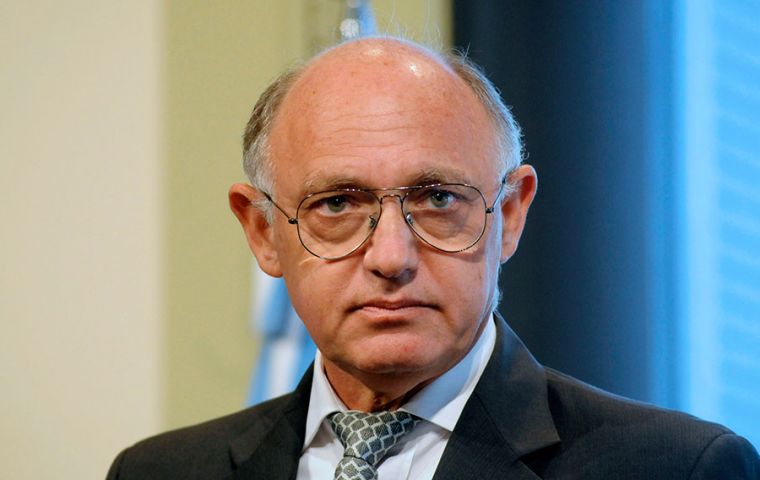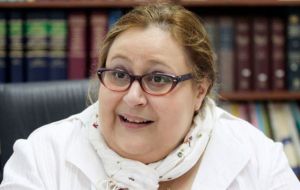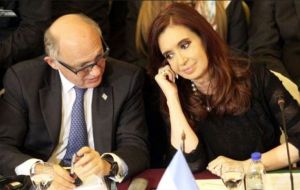MercoPress. South Atlantic News Agency
Cristina Fernandez ex foreign minister, Hector Timerman, dies 65
 Timerman's lawyer, Graciana Peñafort, said the cause of death was respiratory failure. The ex minister had been under treatment for liver cancer
Timerman's lawyer, Graciana Peñafort, said the cause of death was respiratory failure. The ex minister had been under treatment for liver cancer  “He was very deteriorated physically, and his heart simply did not tolerate any more,” Peñafort said.
“He was very deteriorated physically, and his heart simply did not tolerate any more,” Peñafort said.  Timerman was foreign minister under President Cristina Fernández from 2010 until 2015, the year she left office
Timerman was foreign minister under President Cristina Fernández from 2010 until 2015, the year she left office Hector Timerman, a former Argentine foreign minister who was charged with treason in 2013 for his role in negotiating an agreement with Iran relating to the 1994 bombing of a Jewish community center in Buenos Aires, died Sunday at his home here. He was 65. His lawyer, Graciana Peñafort, said the cause was respiratory failure. Timerman had been under treatment for liver cancer, she said.
His lawyer, Graciana Peñafort, said the cause was respiratory failure. Timerman had been under treatment for liver cancer, she said. “He was very deteriorated physically, and his heart simply did not tolerate any more,” Peñafort said.
Timerman was foreign minister under President Cristina Fernández from 2010 until 2015, the year she left office. His tenure was marked by increasing tension between Argentina and the United States. He had served as Argentina’s ambassador in Washington from 2007 to 2010, and before that as consul in New York.
The memorandum of understanding that Timerman signed with Iran in 2013 was billed as an effort to get answers from the Iranians who were accused of carrying out the suicide bombing of the Jewish community center, the Argentine Israeli Mutual Association, or AMIA, in which 85 people were killed and some 300 injured.
The deal, which called for the two countries to set up a joint commission to investigate the bombing, was approved by Congress but later declared unconstitutional. Iran has long denied any involvement in the bombing, for which no one has been convicted.
In 2006, Argentine prosecutors accused top Iranian officials, including former President Akbar Hashemi Rafsanjani, as well as Imad Mugniyah, a Lebanese senior commander of the militant group Hezbollah, with being involved in the attack. Mugniyah was assassinated in 2008, and Rafsanjani died in 2017.
Federal prosecutor Alberto Nisman characterized the agreement with Iran as part of a cover-up to ensure that Iranians would never face justice. He contended that the memorandum was the first step toward canceling fugitive notices, known as red notices, that had been filed with Interpol, the international police organization; the notices had prevented the suspects from traveling freely.
Shorty after he made the accusation against Fernández and Timerman, Nisman, was found dead in his luxury apartment in Buenos Aires with a gunshot wound to the head in January 2015. His death remains unsolved.
In December 2017, a federal judge, Claudio Bonadio, ordered that Timerman and several other key officials in Cristina Fernández’s government be taken into custody for their role in the agreement with Iran. Timerman was granted home detention because of his illness.
Bonadio said there was enough evidence to indict Fernández and her former allies for treason because they had sought “impunity for the Iranian nationals accused of the attack on the AMIA headquarters and to normalize relations between the two states.”
Shortly after the judge’s decision, the New York Times published an opinion piece by Timerman in which he called himself a “political prisoner.”
Cristina Fernández said in twitter that Timerman, as a Jew, had been particularly interested in making sure that those who carried out the 1994 bombing were brought to justice. “Hector got sick due to the pain and suffering provoked by the irrational and unjust attack that we both suffered due to the signing of the memorandum of understanding with Iran,” Fernández wrote.
Timerman’s efforts to receive medical treatment in the United States were derailed when his U.S. visa was canceled following the indictment. Although the visa was reinstated, allowing him to travel, supporters say the lapse cost him precious time.
“His respiratory issue was the tragic result in the delay of being able to travel to the United States in January 2018,” Peñafort, his lawyer, said in a text message. “When he finally got to the United States, it was too late to carry out the treatment that would have improved his living conditions in these last months.”




Top Comments
Disclaimer & comment rules-

-

-

Read all commentsOf the dead, let nothing but good be said.
Jan 02nd, 2019 - 10:27 am +1Hector Timerman is dead. Good.
Don Alberto
Jan 02nd, 2019 - 01:08 pm +1Following your lead, I liked his father's courage.
Patrick
It's very clear to most Argentines that they themselves were responsible.
Nismans death? Any fule kno who dunit, state sponsored RG death squad! As for old Timmernan his Dad would have rolled in his grave had he had knowledge of his sons misdeeds. His Jermyn Street excursions and Harrods trips are his legacy. A donkey would have made a better Foreign Minister.
Jan 03rd, 2019 - 11:01 am -2He never sorted our Sepoys….
Commenting for this story is now closed.
If you have a Facebook account, become a fan and comment on our Facebook Page!